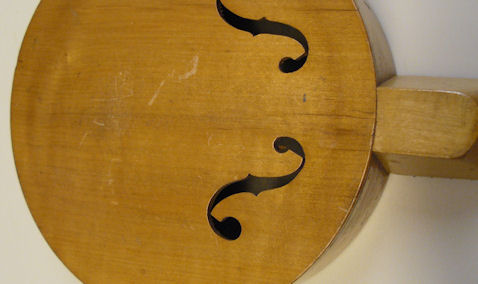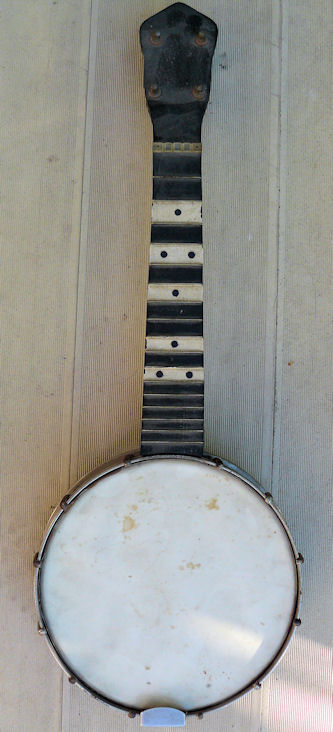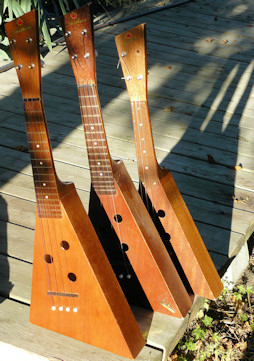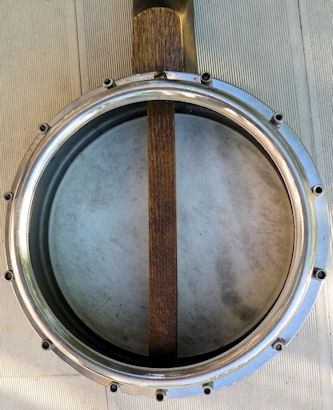




Vintage instruments
I'm not a collector of old instruments, and while I can appreciate their aesthetic qualities as objects of visual adoration, I much prefer newer, more modern instruments to play.
Which is a bit odd, if you consider I like lots of vintage and antique things: old British motorcycles, vintage music, heritage buildings, old trees, old books, Chaucer, Shakespeare and fossils come to mind.
I can't offer any advice about buying and selling vintage instruments, about real or perceived values, or about restoration. I can only comment that some of them sell for a lot more money than I' personally willing to pay for an instrument I am more likely to worship from afar than play.
To me, they're interesting, even beautiful, but don't stir the passions like a new instrument does.
Despite that, I've managed to accumulate a few vintage (more than 25 years old) ukuleles, sometimes not deliberately.
 I
have picked up three Northern ukuleles, products of
J. Chalmers Doane's program, Ukuleles in the Classroom, that ran in Canadian
schools in the 1970s. These were deliberate purchases, all from Canadian owners.
I
have picked up three Northern ukuleles, products of
J. Chalmers Doane's program, Ukuleles in the Classroom, that ran in Canadian
schools in the 1970s. These were deliberate purchases, all from Canadian owners.
I purchased all of the Northerns in part because of the Canadian connection, and its associated local connection (the program ran in local schools), in part because they were unusual looking and that always catches my fancy, and in part because they are generally overlooked by collectors who will pay hundreds, even thousands more, for ukuleles that are as common or even more common than these. So the price was reasonable because so few people seem to be aware of them. One is in particularly fine shape.
Unfortunately for my own tastes, two are concert scale, one is soprano and I play tenor, with sometimes baritone thrown into the mix. I've put them up for sale, hoping someone who will love them either as playable instruments or want them as collectibles. Contact me if you are interested.
Update: In late May, 2010. these three went together to a good home in the USA.
I've also been given two old banjo ukes (a.k.a. banjoleles), both soprano and both in need of some restorative TLC. Since I'm not a luthier, I haven't the skills to provide that care, nor have I the financial interest in doing so.
Since they're both soprano, I'm reluctant to put money into something I won't ever play. And I really don't need any wall hangers. So again, contact me if you're interested in either or both.
One banjo uke is a wooden framed instrument with wooden back. No logo, but I've seen these for sale in the past on eBay and on other Web sites and it seems they're from the late 1920s-early 1930s and were sold under many names and brands.
The other has a metal body and says U-King on the tailpiece. Based on what other Web sites say about U-King, it seems to be from the same interwar-period (1930s) and could be a nice instrument when brought back to life. banjo ukes were made very popular in that era thanks to the popularity of George Formby.
 Both have okay skins, although the wooden one is slightly more worn. But
overall they're both in reasonable shape, given their ages, and from what I can
see, are both restorable by someone with more talent and patience than I have.
Both have okay skins, although the wooden one is slightly more worn. But
overall they're both in reasonable shape, given their ages, and from what I can
see, are both restorable by someone with more talent and patience than I have.
Were I the restorer, I would dress the frets because they strike me as tall and sharp, enough to discourage some styles of fingerpicking. Or perhaps just my personal style.
Not to mention that Susan really doesn't like the banjo uke sound, so I was exiled to another part of the house whenever I practiced on the Waverly Street banjolele (and it was a tenor, too). I like to be able to play in less secluded spots.
Any interest in these? Please contact me if so. They're better off in your collection if you can restores them, than they are in my closet.
